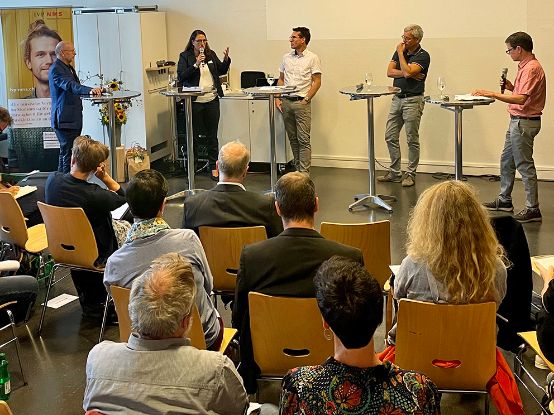Basic musical education: neglected and procrastinated
For 10 years, the Confederation and the cantons have been constitutionally obliged to promote musical education for young people. BV 67a is unique internationally, but far from being fulfilled.

On September 23, 2012, the "Youth and Music" initiative achieved an almost historic success: 73% of voters cast their ballots in favor and all the cantons also said yes. This means that our country has committed itself to taking special care of music as an educational asset. The University Institute IVP NMS Bern has together with Education Bern (Professional Association of Teachers) and the Association of Bernese Music Schools VBMS dared to attempt an interim review on September 3 - yes, an interim review after 10 years, because the implementation of Article 67a of the Constitution "Musical Education" has not yet been completed. Paragraph 1 (promotion of musical education for children and young people) was covered by the broad-based promotion program "Youth and Music", and the so-called "Talent Card" is currently being developed to implement paragraph 3 (access to music-making and promotion of talented young people). Of the more than thirty implementation measures proposed by the working group at the time, only two were selected. - The initiators at the time had to learn the hard way that politics is not a concert of wishes.
The crux of the matter with cantonal sovereignty
Paragraphs 1 and 3 are the responsibility of the federal government and were therefore tackled first. As far as paragraph 2 (high-quality music lessons in schools) is concerned, we have not made much progress after 10 years. The legal text quickly comes up against the limits of the principle of cantonal educational sovereignty, which is why the issue has been passed back and forth between the cantons and the federal government like a hot potato for 10 years.
Of course there is good music teaching at elementary school - but is it "high quality", as the law prescribes? The trend tends to point in the opposite direction. The number of music lessons actually held is declining throughout Switzerland. The Curriculum 21, with its greater emphasis on other subjects, the fact that music is no longer an optional subject at teacher training colleges, the current shortage of teachers and the associated lack of musical expertise among many teachers are all contributing to this trend.
The speaker of the Symposium "High-quality music lessons in schools", Letizia Ineichen, is a subject didactician and author of a dissertation on the significance of Article 67a para. 2 of the Constitution for music education in basic education. She presented an analysis of the weekly timetable from the 2019/2020 school year: the number of music lessons varies greatly depending on the canton. The most music is taught in the canton of Schaffhausen: three 45-minute lessons in years 1 and 2, two in years 3 to 6. At the other end of the scale are Zug and Appenzell Innerrhoden with only one lesson throughout. In a second analysis, Ineichen compared the training programs of the PHs in Bern, FHNW, Lucerne, St. Gallen and Zurich. With the exception of the St. Gallen PH (where all subjects are studied), the "multiple profile" applies, i.e. 2 out of 9 subjects can be opted out of. Music is one of them. Students who received good music lessons at grammar school are more likely to choose music as a subject at the PH. "The musical training of primary school teachers begins at grammar school," emphasized Mark Grundler, former lecturer at the Bern University of Teacher Education and head of primary school, but noted: "Unfortunately, we have more and more musically illiterate applicants."
Improved training and cooperation
"Too much time has passed without anything significant having changed," says Letizia Ineichen and suggests a number of possible improvements: "High-quality music teaching implies quality and professional expertise on the part of the teachers. Subject-specific, didactic and musical-instrumental skills are an important prerequisite for success." This can only be achieved through good training. Support in the form of coaching and mentoring as well as further training opportunities for career starters and non-specialist teachers are necessary; the "university filling station" alone is no longer sufficient. Cooperation could take the form of institutionalized collaboration between the elementary school, the teacher training college, the music school and other educational partners.
Elementary school should be more open to external music teachers who teach music together with class teachers or on their own. In turn, these teachers should be offered appropriate training programs at universities, for example in the form of a "minor program in primary music teaching".
There is no shortage of good ideas for cooperation. This was also demonstrated by Michael Marending, teacher at the Langenthal and Bantiger music schools, who presented his cooperation project between music schools and elementary school in the form of a music day. The principal of MS Zuchwil, Michael Vescovi, presented the Solothurn model. In his canton, the music schools are part of the elementary school and are usually located in the same building. This makes collaboration easier in many respects. Projects can be set up as joint school projects from the outset.
The conference raised many central and long-neglected questions and hopefully provided the impetus for a renewed discussion of the topic after 10 years. It looks as if the cantons will not be able to avoid "harmonizing the objectives of music teaching in schools" (BV Art. 67a para. 2) if they want to achieve the required high-quality music teaching. A first step can hardly be expected from the federal government.
Details of the picture
On the podium are (from left to right)
Peter Hänni, Bern-Mittelland School Inspectorate
Letizia A. Ineichen, Lecturer at the Lucerne University of Teacher Education and Head of the Lucerne City Office for Culture and Sport
Mark Grundler, Head of Pestalozzi Primary School in Thun
Ruedi Kämpf, lecturer in music didactics at the IVPNMS in Bern
Christian Lüscher, Moderation








